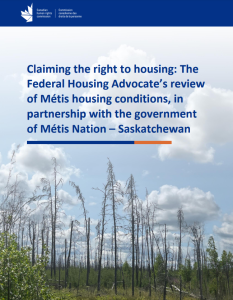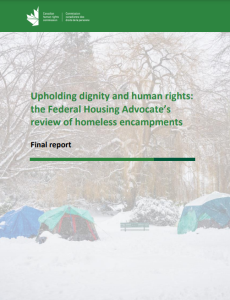Federal Housing Advocate
The Federal Housing Advocate is an independent, nonpartisan watchdog, empowered to drive meaningful action to address housing need and homelessness in Canada.
Who is the federal Housing Advocate?

Canada’s first and current Federal Housing Advocate is Marie-Josée Houle.
The Federal Housing Advocate is a nonpartisan watchdog whose mission is to hold governments accountable for their human rights obligations to address housing need and homelessness across Canada. The Advocate is a key driver of systemic change and promotes and protects the progressive realization of the right to adequate housing across the country.
Canada’s first and current Federal Housing Advocate is Marie-Josée Houle, who is responsible for making formal recommendations to improve Canada’s housing laws, policies, and programs so that they enable everyone in Canada to have access to adequate, affordable and safe housing that meets their needs.
Some of the critical ways the Federal Housing Advocate achieves this is by requesting a review panel to be established or through formal, Advocate-led human rights reviews on systemic housing issues (see more below).
advocate-led Human rights reviews
The Federal Housing Advocate receives submissions from people all across Canada on the systemic housing issues they are facing, conducts a thorough investigation on these issues, and makes formal recommendations to the government on how to address them. The Government of Canada must respond to the Advocate’s findings within 120 days.
See below for the Federal Housing Advocate’s human rights reviews.
 The Federal Housing Advocate was invited by the Métis Nation – Saskatchewan (MN-S) to conduct a systemic review of the housing and homelessness conditions experienced by the Métis in their homeland.
The Federal Housing Advocate was invited by the Métis Nation – Saskatchewan (MN-S) to conduct a systemic review of the housing and homelessness conditions experienced by the Métis in their homeland.
On October 23, 2024, the Advocate released her final report which found that Métis communities experience disproportionately higher rates of homelessness and housing precarity compared to the non-Indigenous population. Additionally, they experience higher rates of addiction and mental health issues. Causes for these disproportional rates can be found in a history of a denial of rights, racism and systems that perpetuate harm.
This report shows that the Métis have experienced historic barriers to adequate housing that date back to the 1800s. This is the result of government policies and actions that sought to disempower the Métis. Originally, thriving Métis communities located across what is now northern Saskatchewan pre-dated or existed concurrently with the Red River Settlement. The lives of the Métis dramatically changed with Confederation and the opening up of the country for colonization.
This review is unprecedented and is the first comprehensive report on Métis housing conditions. Métis in Saskatchewan need a housing supply that that fulfills their right to adequate housing. It must be affordable, habitable, accessible, available with supports, and culturally relevant.
Recognizing the severity of the human rights crises occurring within homeless encampments all across Canada, the Federal Housing Advocate launched a systemic review on the issue in February 2023.
On February 13, 2024, the Advocate released her final report which found that homeless responses across the country are being hindered by the absence of effective coordination between the many agencies, departments, and jurisdictions involved. While municipalities are on the frontlines in responding to encampments, they don’t have all the powers and resources they need to provide human rights-based services. As such, the Advocate recommended that the federal government urgently establish a National Encampments Response Plan.
“Canada has the capacity to end the housing and homelessness crisis. This requires a human rights approach that puts people first. We must prioritize housing that is safe, healthy, and affordable for everyone… and this housing must remain affordable in perpetuity, so we don’t find ourselves here again in another generation.”
– Federal Housing Advocate, Marie-Josée Houle
The right to adequate housing is a human right for everyone in Canada, yet many people live in housing that does not meet basic standards and needs, and many do not have a place to live at all.
The Federal Housing Advocate is now receiving submissions from individuals and organizations on systemic housing issues, human rights violations, and unmet housing needs across Canada. If you have experienced, witnessed, or worked to address violations of the right to housing—like homelessness, evictions, unaffordability, inaccessibility, or other forms of inadequate or insecure housing—you can make a submission to the Advocate.
Federal Housing Advocate faqs
Advocate-led reviews and review panels will only hear selected systemic housing issues. It will not hear individual complaints about housing rights. These systemic reviews often include hearings that offer the public, particularly members of affected communities and groups with expertise and experience in human rights and housing, an opportunity to contribute effectively to ensuring that housing policy and programs are consistent with the recognition of housing as a human right.
After the review on a particular issue is completed, a report will be prepared by the Federal Housing Advocate (if it’s an Advocate-led review) or the National Housing Council (if it’s a review panel) for the federal Minister that states the conclusions and its recommendations regarding the measures that must be taken to ensure compliance with the government’s commitment to the right to housing. The Minister must then provide a response within120 days, outlining what will be done, which then must be tabled in the Senate and House of Commons.
This innovative approach to rights claiming is designed to be efficient and targeted to the most important systemic issues, giving a meaningful voice to rights holders in identifying the most critical issues and the appropriate responses.
The federal government, specifically the Minister of Housing, Infrastructure, and Communities, the Honourable Sean Fraser, has 120 days to respond to the Advocate’s reports and recommendations with a plan of action.
On May 30, 2024, Minister Sean Fraser officially responded to the Advocate’s report on Canada’s encampments crisis: Read here.
In September of 2024, the federal government announced their plan on how they will use the $250 million—first announced in Budget 2024—to address encampments and unsheltered homelessness across Canada. Here is the Federal Housing Advocate’s response.
One of the key roles of the Federal Housing Advocate is to request that the National Housing Council establish a Review Panel to hold a hearing to review any systemic housing issue within federal jurisdiction.
Review Panels consist of three members from the National Housing Council, and provide members of affected communities as well as groups that have expertise in human rights and housing an opportunity to participate. The panel then prepares a report with conclusions and recommendations for the Minister responsible for housing, who must respond within 120 days and table that response in the House of Commons and the Senate.
The findings and recommendations brought forward by the Advocate and the Review Panel will help to identify solutions and necessary reforms to laws, policies and programs that affect housing and homelessness in Canada. This mechanism is a way to target the most critical systemic issues, as well as urge the government to take action on them. It also gives members of affected communities an opportunity to be included and participate in the process, and to contribute to housing policy and solutions.
For more information on review panels, click here.



